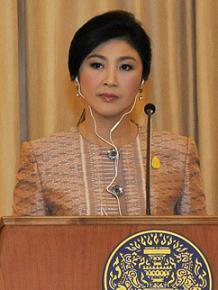Round one to Yingluck’s government
In late November and early December, Thailand's capital of Bangkok was rocked by unrest as protesters, ostensibly seeking to curb the influence of former Prime Minister Thaksin Shinawatra on the government of the current prime minister, Thaksin's sister Yingluck Shinawatra, clashed with riot police and briefly broke into Army headquarters.
The demonstrations have been led by Suthep Thaugsuban, a high-ranking member of Thailand's pro-military Democrat Party, and former deputy prime minister under Abhisit Vejjajiva. Between 2006 to 2011, the Democrat Party was twice placed in power following coups by the Thai military. Using pseudo-populist rhetoric to mask anti-democratic policies, those behind the protests have targeted Yingluck and the Puea Thai Party--which is associated with Thailand's pro-democracy "Red Shirt" movement. Puea Thai won a landslide victory in 2011 elections, making Yingluck Thailand's first woman prime minister and giving a parliamentary majority to a coalition led by Puea Thai.
is a Thai dissident who lives in exile today. Faced with charges of the supposed crime of "lese majesty"--basically, not being loyal to Thailand's head of state, King Bhumibol--and a possible prison sentence of 15 years, he fled the country in 2009. Here, he comments on the recent protests and what they could mean for democracy in Thailand.
THERE IS still a real danger that over the next few days, influential members of the elite and military will pressure the government to make way for a "government of national unity." But a semblance of calm has returned to Bangkok as the royalist anti-democratic protesters were allowed to symbolically occupy Government House. They took pictures and then left.
A temporary truce has occurred around the king's birthday, since the royalists did not want to appear disrespectful to their "dear leader." The government also wants to show its loyalty by staging the usual ceremonies in a calm atmosphere.
Former Prime Minister Thaksin Shinawatra is, after all, a royalist, too. But don't be fooled. The aged king has no real power, and he has never been brave enough to stick his neck out and do anything under his own initiative. He is a tool of the military and the elites. The real power is with the army.
So what is the score so far in the battle between the royalist conservatives and the elected government?

On the government's side, the fact that it refrained from using violence against the unruly mob of royalists is very much to its credit, and it has strengthened its position on the moral high ground. Its legitimacy far outweighed the royalist thugs already, because the government was clearly democratically elected, while the royalists called for a dictatorship.
So far, the government has refused to resign or dissolve parliament. But we do not know what will happen in the days and months ahead. There was much pressure on the government from reactionary academics and NGOs who called for parliament to be dissolved. The Thai University Rectors' conference even added the view that a future prime minister need not be elected. These people's political position is not a surprise. They all supported the 2006 coup, accused the majority of the population of lacking intelligence and cheered the military crackdown on pro-democracy protests in 2010.
What was more surprising was that a few naïve academics, with good democratic credentials, also called for the dissolution of parliament. This was a mistake. Back in 2006, Thaksin dissolved parliament and called fresh elections. But the opposition then refused to stand in the elections because they knew that they would lose.
SUTHEP THAUGSUBAN'S royalist mobs have said they would reject an election anyway. One way out would be a referendum, perhaps on the need to abolish the military constitution. If the government won, it would be a vote of confidence. If they lost, they would have to resign. But it is unlikely that Puea Thai are progressive enough to want such a referendum in the first place.
On Suthep's side, his proposals for an unelected assembly, appointed by himself and his friends, and a peoples' government of "good" dictators did not win him any extra friends. He hoped to spur the military into staging a coup, but so far the military don't want such a coup.
The military did a deal with Thaksin and Puea Thai back in 2011. Even if the military stepped in once again, they would hardly put Suthep's agenda into practice. Why give power to the monkey when the organ-grinder makes the key moves?
The Thai ruling class knows from bitter experience that they need some kind of democratic process, and that they cannot just brush aside the Red Shirts and government supporters. Suthep has led his troops up to the top of the hill and down again, and that has not increased his credibility. His mate, former Prime Minister Abhisit Vejjajiva, had to come out with a string of pathetic lies in a CNN interview in order to justify their position. That hardly bolstered their legitimacy.
There is still a real danger that sections of the elite will turn to the idea of a "government of national unity." This would almost be the same as a coup, and it should be opposed.
It may not happen. Most Red Shirts and probably the majority of the electorate would be against this. But the government and the Red Shirt United Front for Democracy against Dictatorship (UDD) leadership might try to sell it to the Red Shirts by saying that there was "no alternative."
There is an alternative. The democratic space can be expanded through the actions of pro-democracy movements, including pro-democracy trade unionists. The various reform proposals by the Nitirat Group should be placed at the top of the agenda and the lese majesty law should be abolished. These would just be first steps in the right direction.
First published at Red Shirt Socialist.


